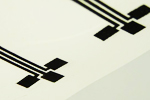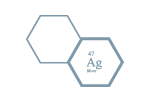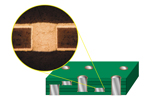 Methode has been formulating and manufacturing polymer thick film (PTF) inks for the electronics industry for over forty years. As experts in developing conductive and resistive inks, Methode has developed innovative aqueous-based inkjet conductive inks for the growing printed electronics market, and print-and-assemble sensor assemblies. Our assemblies can be customized to meet your physical layout, substrate material, electrical conductivity and durability needs. Utilized in applications like fuel level, throttle position, printer media detection, RFID and patient oxygen sensing, these sensors incorporate our conductive and resistive design expertise.
Methode has been formulating and manufacturing polymer thick film (PTF) inks for the electronics industry for over forty years. As experts in developing conductive and resistive inks, Methode has developed innovative aqueous-based inkjet conductive inks for the growing printed electronics market, and print-and-assemble sensor assemblies. Our assemblies can be customized to meet your physical layout, substrate material, electrical conductivity and durability needs. Utilized in applications like fuel level, throttle position, printer media detection, RFID and patient oxygen sensing, these sensors incorporate our conductive and resistive design expertise.
Technology Fundamentals
Polymer thick film (PTF) is a field-proven materials and process technology used to create Printed Circuit Boards (PCBs) suitable for small features and layers, which can be printed on top of each other to develop multiple functions. PTF technology can be used in increasingly complex ways, including combing PCB manufacturing techniques to provide automotive component designers with a resource that can enhance product performance, improve reliability, raise quality levels and reduce overall component costs.
Our PTF inks are RoHS compliant and create negligible Volatile Organic Compounds (VOCs) during printing, alleviating the need for specialized ventilation during application. stivity, stable physical and electrical properties, generous processing windows based on substrate material, and aggressive miniaturization and increased functionality in electronic circuitry. Utilizing PTF, Methode designs and manufactures cermet and inkjet printed sensor assemblies for a wide breadth of industries including medical, automotive, industrial and military.
stivity, stable physical and electrical properties, generous processing windows based on substrate material, and aggressive miniaturization and increased functionality in electronic circuitry. Utilizing PTF, Methode designs and manufactures cermet and inkjet printed sensor assemblies for a wide breadth of industries including medical, automotive, industrial and military.
9101 Inkjet Conductive Silver Ink
 Methode's aqueous-based inkjet formulations are designed for all drop on demand printhead technologies as well as a variety of flexible and rigid substrates. The inks contain conductive silver nanoparticles and achieve electrical resistance as low as 200 milliohms per square within minutes of printing. The inks do not require secondary curing or additional processing on many coated substrates. These silver inks can be inkjet printed onto flexible substrates such as polyester, synthetic polymer sheets, coated papers and rigid substrates. Offering resolutions as fine as 100 micron lines and spacing, the ink is suitable for use in the printed electronics market, including sensors, flexible displays, photovoltaic arrays, RFID, security and lighting.
Methode's aqueous-based inkjet formulations are designed for all drop on demand printhead technologies as well as a variety of flexible and rigid substrates. The inks contain conductive silver nanoparticles and achieve electrical resistance as low as 200 milliohms per square within minutes of printing. The inks do not require secondary curing or additional processing on many coated substrates. These silver inks can be inkjet printed onto flexible substrates such as polyester, synthetic polymer sheets, coated papers and rigid substrates. Offering resolutions as fine as 100 micron lines and spacing, the ink is suitable for use in the printed electronics market, including sensors, flexible displays, photovoltaic arrays, RFID, security and lighting.
3800 Series Resistive Carbon Inkjet Inks
Methode's aqueous-based inkjet formulations are designed for all drop on demand printhead technologies as well as a variety of flexible and rigid substrates. The inks contain conductive carbon nanoparticles and achieve electrical resistance as low as 2000 Ohms per square. The inkjet inks can be printed onto flexible and rigid substrates such as polyester, synthetic polymer sheets, coated papers and acrylic. Offering resolutions as fine as 100 micron lines and spacing, the ink is suitable for use in the printed electronics market, including sensors, secure packaging, lighting, RF shielding, and toys.











